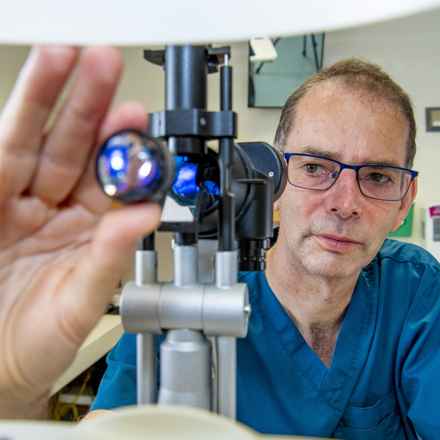Stargardt pill continues to slow sight loss
Posted: Tuesday 28 November 2023
A drug being trialled as a potential treatment for Stargardt disease has been shown to slow down the rate of sight loss.
A clinical trial where patients were given Remofuscin tablets over two years has been shown to slow down the rate of progression in the disease, which affects approximately one in 10,000 people.
The drug works by removing a material called lipofuscin, which builds up in the macula in Stargardt disease and damages the important retinal pigment epithelium (RPE) cells.
Efforts to remove lipofuscin from the RPE cells, either through natural processes or existing therapies, have proven unsuccessful but Remofuscin is looking promising as an effective treatment to preserve sight.
As well as Stargardt disease, Remofuscin is also being tested as a potential treatment for dry age-related macular degeneration (AMD), having completed Phase I trials alongside the Phase II study for Stargardt.
Professor Andrew Lotery of the University of Southampton Hospitals Trust, who worked closely on the Remofuscin project, said: “It’s been a successful trial to date and we’ve seen some promising findings in terms of reducing retinal thinning. Further studies to evaluate Remofuscin as a treatment for both Stargardt and dry AMD are now needed and that is being explored.”
The findings have been reported by biopharmaceutical company Katairo GmbH, which recruited 87 patients for the first stage of the trial. Sixty-one people completed the second year of treatment, of which two thirds of patients received two Remofuscin tablets daily. One third of participants received a placebo.
Welcoming, the latest results, managing director of Katairo GmbH, Dr Wolfgang Klein, said: “We are very pleased with the outcome of this study. Retinal thinning is known to precede the formation of atrophy in Stargardt disease. These results with Remofuscin are good news for patients hoping to finally have a treatment slowing the disease process.”
To stay up to date with developments in ongoing clinical trials, subscribe to our monthly enewsletter.
Stargardt disease
Stargardt disease is a genetic condition caused by a tiny alteration in a single gene. It is the most common form of juvenile macular dystrophy.
Treatments
Read more about treatments available for patients with macular conditions, including wet AMD. Get expert insights from the Macular Society on the latest research into treatments.
Our research projects
Since 1987 the Macular Society has invested around £10 million in over 100 research projects.
Support for you
We provide free information and support to those with macular disease, along with their family and friends, to help people keep their independence.
Get the latest news and advice from the Macular Society
To hear about life-changing research, treatments and tips for living with sight loss, subscribe to our monthly enewsletter today. Together we can Beat Macular Disease.
Sign up to our free email newsletter





